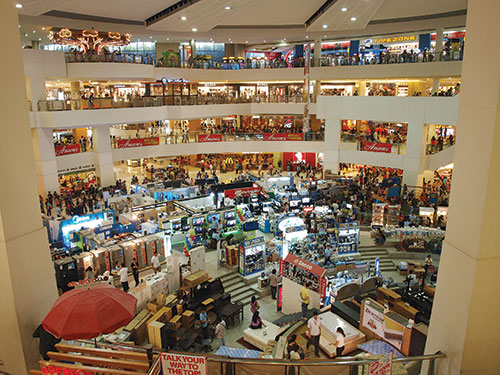

Convenience has been the driving force behind many of the recent advances in retail. From offering a wider range of products and services to increasing opening hours, retailers have adjusted their offering to fit shoppers’ demands.
The rise of e-commerce is no different. Websites are open 24 hours a day and shoppers can browse when and where it suits them with various mobile payment alternatives. Advances in logistics have made same-day delivery and international shipping widely available. Shopping behaviour has changed over the last few months, which has hastened the need for digitalised solutions and adaptions.
A fundamental change in behaviour
Although online shopping has been steadily rising, recent events have led to an upsurge in e-commerce. Through necessity, footfall has been reduced due to the pandemic. Consumers have turned to online shopping for their supplies, as they want a convenient yet contactless way to order their items and pick them up or get them delivered. This most often frictionless experience has set the expectation for the future of the retail industry. Consumers that were hesitant to adopt online shopping before have been forced or prompted to shop differently, often online for the first time. And if the experience was positive they are most likely to continue with their new way of convenient shopping.
As lockdown measures gradually ease, shoppers will return to stores, as opposed to shopping exclusively online. However, concerns around hygiene and maintaining physical distance will remain. A recent survey found that 87% of US shoppers prefer to shop in stores with “touchless or robust self-checkout” options. In fact, two-thirds now using self-checkouts compared with one-third before the pandemic.

In addition, new shopping methods like BOPIS (buy online pick up in store) and BOSS (buy online and ship to store) have increased in popularity, as these reduce the potential for contact. Half of US consumers have used BOPIS as a result of COVID-19, and according to a consumer flash poll, a quarter of the participants has done so more than once. Consumer behaviours that have been established during the pandemic will most likely remain and expectations of convenient contactless options will continue to grow.
Convenience can mean different things to different shoppers though, and each customer will have their own preference on what is most important to them. Before the pandemic, our global research showed that shoppers rated factors such as fast queues, smooth in-store navigation and simple returns highly when it came to improving convenience. This expectation is likely to intensify and against this background, frictionless shopping will be welcomed as the new normal and retailers will be challenged with delivering it consistently.
Retailers adapting to new circumstances
The reopened retailers are faced with challenges of having to keep up with new health and safety guidelines – such as deep cleaning, limited in-store customer numbers, Plexiglass protection at tills and the two-metre distancing rule. But they also need to cater to the shift in consumer behaviour that requires them to examine the bottlenecks in the customer journey and viewing the online and in-store experience through a single lens. Asking questions such as “where is the customer spending the most time?” and “what factors contribute to customer friction at this stage?” will help direct and inform the areas of focus. Here technology can help in addressing these pain points and enable smoother processes.
For example, in a traditional store, customers typically wait in line to purchase items. Long waiting times are a common complaint, and could be affected by the number of staff on duty or the number of customers present at the time. In fact, our research found that 53% of New York City shoppers leave the store without purchasing due to checkout lines being too long.
A smarter approach could be to use surveillance technology to count the number of shoppers in the queue and alert staff when a threshold is reached. An action to open more tills could then be taken to ensure that waiting times are reduced. However, this strategy depends on the availability of staff, which could be limited in accordance with general regulations. Self-checkout tills offer an alternative as they ensure that transactions can be completed regardless of the number of staff on duty. They also help to minimise personal contact, which may alleviate concerns around hygiene.
Prioritising convenience means that retailers consider the lifestyles and needs of their customer in their planning. Doing this well starts with understanding how the customer likes to shop and where their challenges lie, both when shopping online or being solely in the physical store. For example, if they like the online process, but are less enthused about the delivery times, options for buying online and picking up in-store might appeal to them.
In addition, designated lockers for collection may be desirable if customers are unable or unwilling to go in-store. The 24/7 nature of automated lockers allows customers to pick up items at their convenience. Depending on the type of retailer, virtual personal consultations starting via web, chat or phone could guide the customer to finalise the purchase without needing human contact in the store.
Keeping the human interaction
Although a truly frictionless experience would satisfy the needs around convenience, humans are social creatures at heart. Lockdown has taken its toll on the population and some interaction may be welcome. This is where the in-store experience has an advantage over online transactions. The ability to ask a member of staff for assistance or recommendations in real time may be more valuable than being able to complete a purchase in record time.
There is an opportunity for retailers to ensure that staff are located in the store where they are most needed; people counting technology and video analytics help to get this right. Achieving the balance between ultimate convenience and giving the customer what they need during a difficult time will be critical.
A frictionless future
The post-pandemic landscape offers retailers an opportunity to directly align with new customer behaviours. Convenience and safety are front of mind for shoppers and prioritising processes that meet their needs will ensure loyalty. For example, changing the store layouts to facilitate navigation and include designated pick-up areas and return locations; sending staff to customers when it’s needed; and shortening queues with contactless payment alternatives. Frictionless retail addresses the areas where customers are concerned and allows them to have an enjoyable experience both online and offline. Implementing these processes also allows retailers to be agile and prepared to withstand future shifts, ultimately strengthening their position during challenging times.
| Tel: | +27 11 548 6780 |
| Email: | [email protected] |
| www: | www.axis.com |
| Articles: | More information and articles about Axis Communications SA |

© Technews Publishing (Pty) Ltd. | All Rights Reserved.